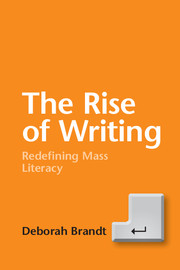Conclusion: deep writing
Published online by Cambridge University Press: 05 January 2015
Summary
In his well received book The Shallows: what the Internet is doing to our brains, Nicholas Carr (2011) argues that our capacity for “deep reading” – sustained immersion in extended, linear text – is going out the window. Fidgety, fragmented, associational, and overloaded, our susceptible brains are being reshaped by how the Internet invites us to read: surf, sample, browse, scan. Like the minds of other generations of humans before us, he says, our minds are adapting to the character of a new and profound technology and leaving behind the old. As traditional print fades from use, the cognition of literacy – including its intellectual effects – will be compromised. As we attend to more, we will want to understand less, and there will be no going back.
To his credit, Carr briefly addresses the irony of presenting his argument in long-book form, an effort that obviously required sustained immersion in his own extended text. But otherwise the cognition of writing gets short shrift in his treatment – even though writing has to be counted among the prominent activities that digital systems solicit and support. For the first time in history, masses of humans have keyboards under their hands that connect them to people at a distance and screens that shine back at them the public look of their own written utterances. Yet these profound social and cognitive changes in the direction of mass literacy go unremarked. That is because Carr, like others, assumes that our literacy can only develop through how we read, and that how we read will condition how we write. If the cognition of text comprehension becomes fragmented and shallow, he assumes, so will the cognition of text production. But might his argument itself be a holdover from the social arrangements of a disintegrating print culture, from a time when readers were presumed to be many and writers were presumed to be few? Is it possible to contemplate a mass literacy based on new relationships between writing and reading such that how and why we write will condition how and why we read? Is it possible – indeed necessary–to contemplate new approaches to literacy based primarily in writing?
- Type
- Chapter
- Information
- The Rise of WritingRedefining Mass Literacy, pp. 159 - 167Publisher: Cambridge University PressPrint publication year: 2014

